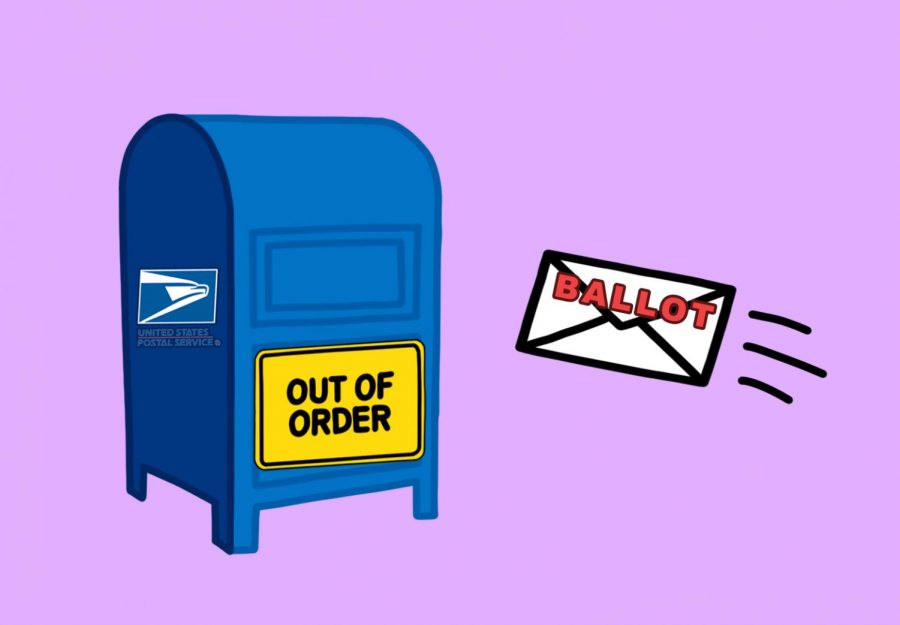Our government needs to fiscally support the USPS
As a consequence of COVID-19, the majority of voting during the 2021 presidential election will be conducted via mail-in ballots. Since the USPS will play a major role in the election process, in addition to its other crucial responsibilities, the United States government should provide the USPS with needed monetary support.
September 10, 2020
The United States Postal Service (USPS), is the public government agency that has been responsible for a large portion of America’s mail since its foundation in 1775. However, in the past 14 years, the USPS has faced some dire financial troubles, due to the rise in email and ecommerce, a decline in paper mail, and its promise to pre-fund retiree health benefits. And, as a consequence of COVID-19, mail volume has collapsed even further, making their revenue suffer even more. Unassisted, the USPS could possibly run out of funding by 2021.
The USPS will be playing a major role in the upcoming election, and the government needs to give it strong financial support. Yet, while the agency is facing an uncertain fiscal future, President Trump has refused to approve a $25 billion stimulus package for the USPS, $3.5 billion of which would go towards handling mail-in ballots for the upcoming presidential election. And since Louis DeJoy, a known Trump donor, was appointed Postmaster General, only more detrimental defunding policies have been enacted that have damaged the USPS further and slowed down mail delivery. The decline of the USPS is a disturbing problem considering how many people rely on the Postal Service for their important mail, and how it seems like political bias is getting in the way of the success of this universal service.
There seems to be a theme regarding Trump and his agenda to push policies that will suppress voting. His aversion to universal mail-in voting, as well as not allowing proper funding to go to the USPS (on the false claim that voting by mail leads to “fraudulent” behaviors), are only two examples of his attempts to restrict the ability of Amercians to go to the polls. Other methods of voter suppression include the closing of polling locations, voter ID laws, and voter roll purges. And, as COVID-19 continues to be a threat to public health, the number of mail-in ballots is expected to double. The USPS should be properly compensated for this drastic increase in mail, so that these ballots can be accounted for in the election.
But voting isn’t the only necessary service that the USPS provides. Many people rely on its services for medication delivery, as the USPS handles over 1.2 billion medication packages annually. With cuts in funding that have increased mail shipping time, this could be detrimental to Americans with life-threatening ailments who require on-time mail delivery. Additionally, the USPS is essential for the success of small businesses who rely on a speedy and on-time delivery for their commerce. The Postal Service acts as a gateway to rural communities as well. The USPS often delivers packages the extra distance that other private companies won’t, due to it not being profitable. If the USPS were to be privatized, this would be a big deal for people in rural areas.
Ever since the recent defunding of the USPS and many high-level personnel shifts in the agency, there are concerns that this may be a starting point for the privatization of the Postal Service. The USPS is and should always be a universal service free from the economic bias that comes with being in the private sector. The job of the Postal Service is not to maximize revenue, but to provide mail delivery for the entire United States public. There is an intense danger in treating the USPS like a business rather than a governmental agency.
Another danger that comes with DeJoy’s new policies is the state of the employees. Over 600,000 people work for the USPS, and the Postal Service is the largest employer in some states. Financial troubles have limited overtime for these employees, and have also led to employees being overworked as well. There is a lot more on the line here than some cheap political points or some extra cash. The livelihoods and careers of people are at risk, and disregarding that reality is irresponsible and reckless.
The favorability of the USPS is one of the highest out of many federal agencies (at a 91% public approval rating), so it obviously has been serving the public well. If you want to help the USPS consider buying stamps to help with funds, or if you’re voting by mail in the presidential election this fall, make sure to send your ballot in as early as possible. It is deplorable to see the USPS being used as a political tool or an asset with a price tag. When it comes down to it, this just seems like a ploy meant to improve Trump’s chances of re-election in the fall, a ploy that the USPS will take the fall for.










